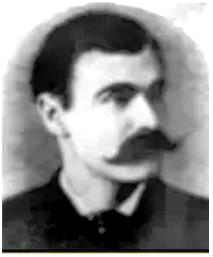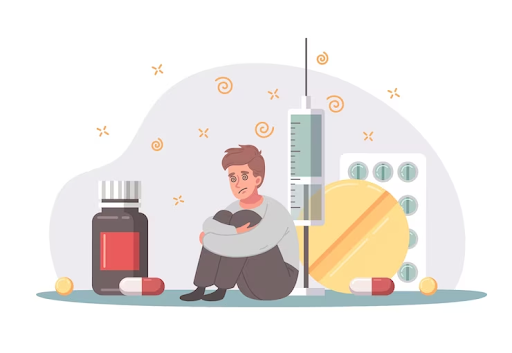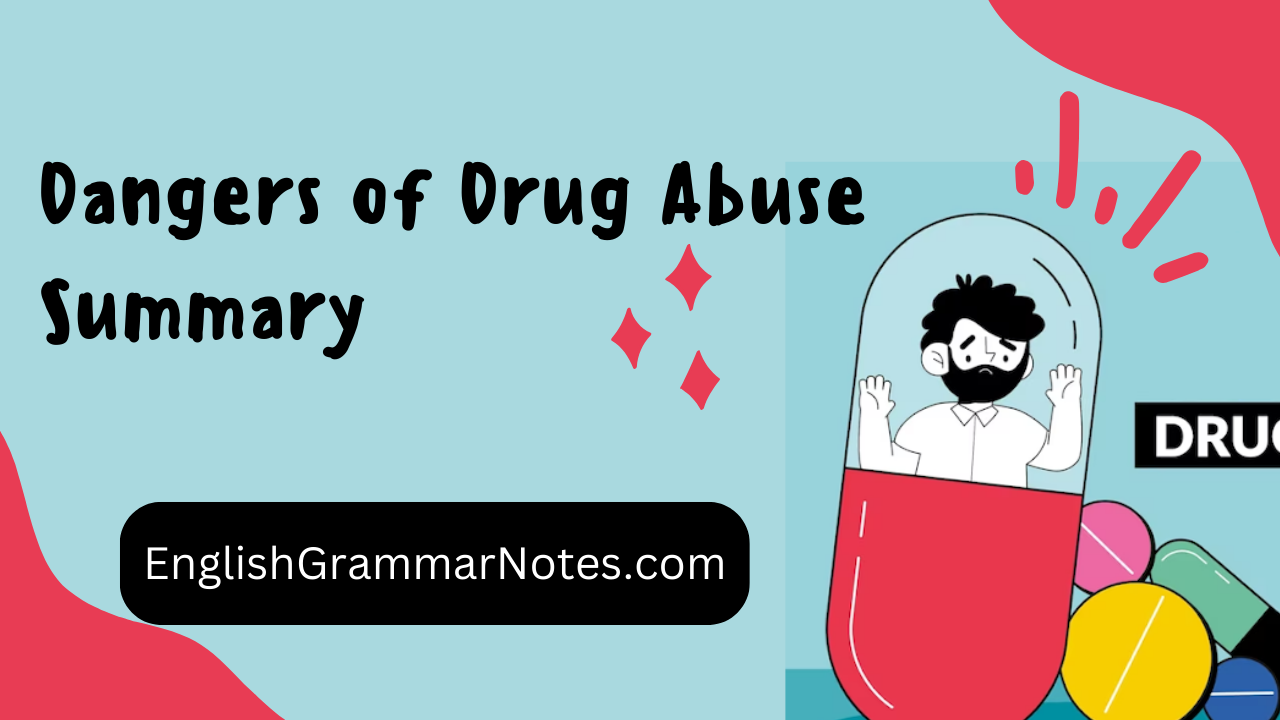Dangers Of Drug Abuse Speech is a pervasive societal issue with far-reaching consequences that extend beyond the individual user. Dangers of Drug Abuse Summary involves the misuse of substances such as prescription medications, illegal drugs, and alcohol, and it poses significant dangers to both physical and mental health. Read More Class 12 English Summaries.
Dangers of Drug Abuse About The Author
Hardin Blain Jones (1914-1978) was born in Los Angeles, California. He was a professor of medical physics and physiology. “Dangers of Drug Abuse’ is a timely warning to modern society.

Dangers of Drug Abuse Summary
Page 119: Drugs were discovered to prevent and cure physical diseases and reverse the disturbances that occur in some mental illnesses. The power of drugs has led people to believe that any ailment, infective or psychic, can be relieved by taking a pill. At the first sign of nervousness, they try pep pills. Medical journals now advertise tranquilizers (which calm you down), amphetamines (used for slimming and also for euphoria) and other mood-altering drugs. Doctors prescribe them and people expect miracles from them. In this situation, drug abuse is widespread.

When people become dependent on drugs to solve their problems, they lose their capacity to deal with life’s situations through perseverance, self-discipline and mental effort. Some people they it is foolish to expend energy on solving a problem when there is an easy way out. People take drugs when they feel bad. They take drugs even when they feel good already.
Page 120: A distinction should be made between medicine and the sensual drugs. We must know the important advances science has made. The history of medical use of drugs goes back 23 centuries to Hippocrates, the Greek physician. He is regarded as the father of medicine. He was the first to say that a remedy must take into account not only the symptoms of the disease but also the constitution and habits of the patient.
As per his teaching, medicines must suit the disease and the patient. When there is a disorder only a drug that specifically mitigates that disorder should be used. The drug should also have restorative effects. Otherwise it will unbalance healthy functions of the brain and the body. It means a healthy person cannot benefit from taking a drug. This also comes from Hippocrates. He said, “Persons in good health quickly lose their strength by taking purgative medicines.”
The difference between medicines and sensual drugs is simple. Sensual drugs are those that the body does not need, but they give the user a strong sense of pleasure. Sensual drugs activate the brain’s pleasure centres. We don’t know how they do it – whethef they stimulate the pleasure centre directly or activate them through chemical mimicry. Both possibilities will be referred to as stimulation.
The brain governs sensations, moods, thoughts and actions. It is done not through any magical process but by an unbelievably complex series of chemically regulated controls. These are easily upset by sensual drugs. They affect on the mechanisms that control pleasure and satisfaction.
A drug user’s craving for the drug continues, but he feels less and less satisfaction. His brain’s pleasure reflexes are activated by artificial stimulation. In severe addiction, the pleasure mechanisms fail to respond to drug stimulation. The drug then gives only relative relief from misery and suspends the illness of withdrawal. Information from the senses still reaches the brain, but the brain is unable to evaluate the information and interpret it as pleasurable. In contrast, naturally attained pleasures enlarge the sense of satisfaction and can be repeated indefinitely.
Page 121: Ultimately, the sensory deprivation of the drug addict shows its# in a general feeling of physical discomfort and in personality changes. The addict feels depressed. He fails to respond eitherto his environment or to other people. His mental disturbance can be like paranoia.
He does not know the source of his problem and he looks for its cause in everything but himself. Anything outside scares him and draws further and further into himself. He feels that others look at him strangely. One even told me that when people smiled at him he thought they were laughing at him. He may even lose his sense of being alive. He feels ‘dead inside’. This is what one rehabilitated heroin addict told me: “Looking out of the window, the sun is shining. The flowers are in bloom. These are signs of a good day.” But pressing his chest, he said, “I don’t feel it here.” Addicts often press their fingers deep into their arms or legs to reassure themselves of their own reality. Their sensations are lost and they look for drug-induced sensations.
If drugs gave a safe form of pleasure, there would be no objections to using them. But we know continued use of drugs has very bad consequences. There are real dangers, but the drug user thinks there is no danger because the harmful side effects are not immediately seen. An overdose may result in delirious effects or even death. Between these extremes there is the danger of degeneration of health and reduced brain function. Drugs act directly on the brain. They cause mental mechanisms to respond abnormally. The risks are great for regular users. A lot of harm may be done before the warning symptoms occur.
Page 122: Drug-related health disorders are many and varied. Dirty needles and solutions used for injecting drugs can cause abscesses in the arms and veins. They can cause liver disease, venereal disease and infection of the kidney and brain. Sniffing cocaine and amphetamines can damage the tissue of the nose. Marijuana and tobacco smoking can cause lung diseases.
Heavy users of alcohol, volatile solvents, amphetamines or marijuana damage their livers permanently. Babies of women addicted to opiates are likely to be bom addicted and to suffer from withdrawal symptoms. Cocaine and amphetamines cause hair fall. Marijuana can damage cells. A drug addict can easily get pneumonia, tuberculosis, malnutrition and weight loss. An overdose of any sensual drug can cause respiratory or cardiac failure and death.
Sensual drugs affect the chemistry of brain cells. Cell function is carried out by thousands of enzymes acting within each cell. Each exposure of the cells to psychoactive drugs alters their chemistry. Toxic chemicals can upset the brain’s intricate system of communication. They can also damage cell tissues. Toxic effect may be permanent.
This article focuses on the effects of drugs on the brain. Drugs affect other parts of the body also and they can be even more debilitating. Damage to the brain is the most subtle and often unrecognized and least understood consequence of drug abuse.
Conclusion:
In conclusion, Dangers Of Drug Abuse Summary Class 12 remains a persistent and multifaceted menace that exacts a heavy toll on individuals, families, and society as a whole. The dangers associated with drug abuse are manifold, encompassing the degradation of physical health, the erosion of mental well-being, the strain on social relationships, and the broader societal costs.
Read More Summaries :
